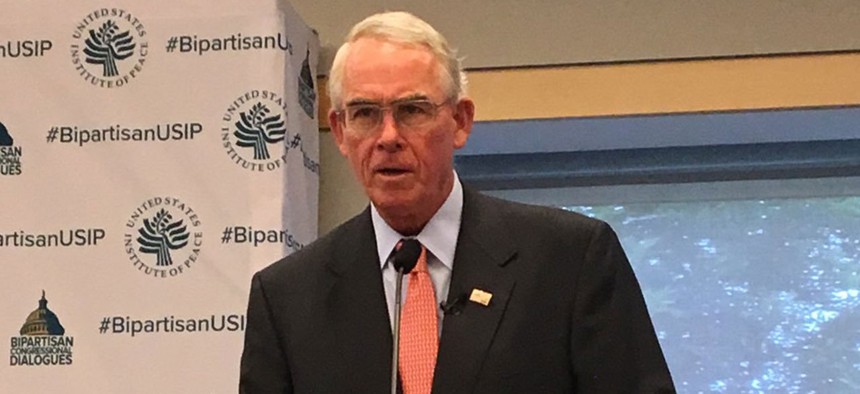
Rep. Francis Rooney, R-Fla., introduced the bill. Office of Rep. Francis Rooney
Republican Lawmaker Seeks to Outlaw Official Time for Union Representational Work
Bill would end the longstanding practice by which union officials can do representational work during duty hours, although chances of it becoming law are low.
A Republican lawmaker recently filed legislation that would end the ability of union employees at federal agencies to receive their normal compensation for representational work, although the prospects for success appear dim.
Rep. Francis Rooney, R-Fla., last week introduced the Do Your Job Act, a bill that would end the practice of official time in the federal government. Official time originated with the 1978 Civil Service Reform Act, which codified collective bargaining as in the public interest, and allowed union employees to do representational work during duty hours to make up for the fact that federal workers cannot be forced to pay union dues.
Although the text of the bill is not yet available on Congress’ website and Rooney’s office did not respond to a request for comment, a brief description says that it would “amend Title 5 [of the] U.S. Code to eliminate the use of official time by federal employees.”
Federal employee unions are not allowed to use official time for internal business, fundraising, or other non-representational work. Official time can be used only when a member is involved in contract negotiations, representing an employee in adverse personnel action proceedings, or advising or representing an employee on potential grievances.
Official time has been in Republicans’ crosshairs since President Trump entered office in 2017. Federal officials claim that unions overuse and misuse the practice, and the Trump administration has replaced “official time” with “taxpayer funded union time” in nearly all reports and contract proposals.
The White House sought to severely restrict the amount of official time available to union officials as part of its controversial workforce executive orders last year. Although a federal judge found key provisions of the orders to be in violation of federal law, including those on official time, a three-judge panel at the D.C. Circuit Court overturned that decision on jurisdictional grounds earlier this month.
Despite the ruling that has temporarily blocked the official time reduction mandate, federal agencies in several instances have pushed for restrictions on official time seemingly in accordance with the executive orders. Agencies repeatedly have argued that these proposals were made independently and not in an effort to comply with the executive orders.
American Federation of Government Employees National President J. David Cox said although he could not speak specifically to Rooney’s legislation until its text is published, unions’ use of official time is lawful and in the interest of agencies and taxpayers.
“All official time is agreed to between the union and management and by law must be reasonable, necessary and in the public interest,” Cox said. “Official time is not for doing union business. Unions do not hold meetings or elections or recruit members on official time. We work in the public interest to provide representation in cases of worker discrimination, ensure workplace safety and protect whistleblowers.”
Tony Reardon, national president of the National Treasury Employees Union, said NTEU would oppose any effort to curtail the use of official time in Congress.
“[Official time] is not union time,” he said. “It is time spent to improve agency operations and the workplace for the benefit of employees, their managers and the taxpayers they all serve.”
The likelihood of Rooney’s legislation becoming law seems remote, with the House in Democratic hands. The House Oversight and Reform Committee, which has jurisdiction on federal workforce bills, is led by Chairman Rep. Elijah Cummings, D-Md., and Rep. Gerry Connolly, D-Va., both strong defenders of federal employee unions.







